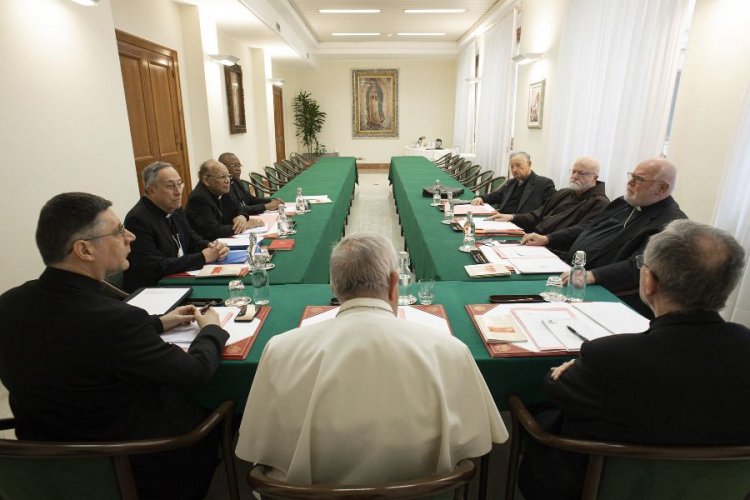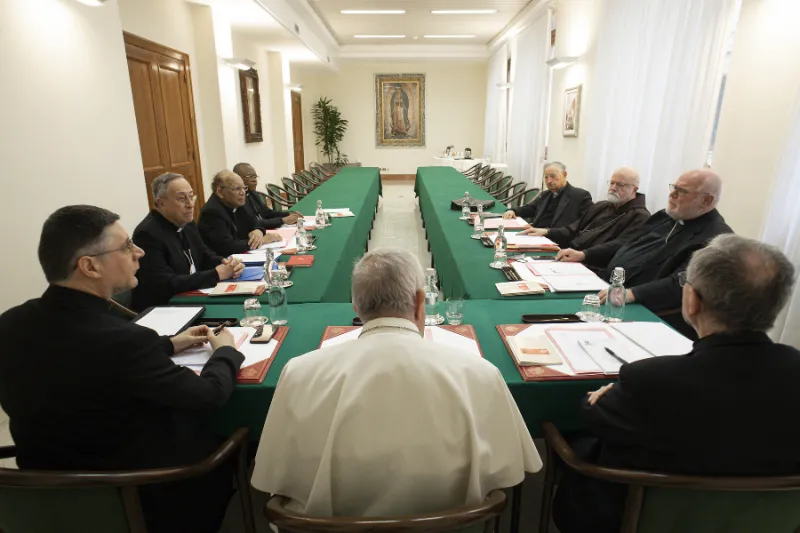Pope Francis’ cardinal advisers discuss role of women in the Church
The Council of Cardinals meets with Pope Francis on Feb. 21, 2022. / Vatican Media. Vatican City, Feb 23, 2022 / 12:20 pm (CNA). Pope Francis’ cardinal advisers have discussed a report on the role of women in the Church, the Vatican said on Wednesday.The Holy See press office said on Feb. 23 that during the three-day meeting the seven cardinals heard and commented on report by the theologian Sister Linda Pocher, F.M.A., on “the role of women and the ‘Marian principle’ in the Church.”Pocher, a member of the Salesian Sisters of Don Bosco, is an adjunct professor at the Pontifical Faculty of Educational Sciences “Auxilium” in Rome.Pope Francis spoke of the “Marian principle,” which theologians often contrast with the “Petrine principle,” in a homily at St. Peter’s Basilica in 2019.He said: “Mary is our Mother. She is the Mother of our people. She is the Mother of us all. She is the Mother of the Church, but she is also the image of the Church. And she is the Mother of our hearts, of our souls.” “There is a Holy Father who says that what can be said of Mary, can also be said in its own way of the Church and in its own way of our souls. Because the Church is feminine and our soul has this ability to receive grace from God, and in a certain sense, the Fathers saw the Church as a woman. We cannot think of the Church without this Marian principle.”He went on: “When we research the role of women in the Church, we can follow the path of functionality because women have functions to perform in the Church. But this is only half the journey.”“Women in the Church achieve more with this Marian principle which ‘maternalizes’ the Church and transforms it into Holy Mother Church.”The role of women in the Church is one of four main topics of the controversial German “Synodal Way.” Members voted last month in favor of a draft text calling for the ordination of women priests. Cardinal Reinhard Marx, one of the seven cardinal advisers, was present at the meeting in Frankfurt, southwestern Germany.During an in-flight press conference in 2016, Pope Francis was asked whether there were likely to be women priests in the Catholic Church in the next few decades.“As for the ordination of women in the Catholic Church, the last clear word was given by St. John Paul II, and this holds,” he replied.Pope Francis has asked two commissions to study the question of a female diaconate in the Catholic Church. The first, established in 2016, examined the historic question of the role of deaconesses in the early Church but did not reach a consensus. He instituted a second commission in 2020, following discussion of the female diaconate during the 2019 Amazon synod.He changed Church law in January 2021 so that women can be formally instituted to the lay ministries of lector and acolyte.The Holy See press office said on Wednesday that the cardinal advisers also spoke about the “necessary conversion” required for members of the Catholic Church to embrace the idea of synodality.“After a conversation in which the various cardinals spoke about the socio-political and ecclesial situation in their regions of origin, they reflected on the theme of synodality as a process of listening and discernment at the heart of the Church’s identity and the necessary conversion that this requires of clergy and laity,” the press office noted.The group of cardinal advisers, sometimes referred to as the C9 because it previously had nine members, was established by Pope Francis in 2013, to “assist him in the governance of the universal Church,” as well as to revise the text of the 1988 apostolic constitution Pastor bonus.At one of the council’s first meetings, it was decided that projected revisions to Pastor bonus would be substantial enough to warrant an entirely new constitution.The cardinals have been working on drafting and revising the text since 2014. In an interview last September, Pope Francis suggested that the document was in its final stages, but the Vatican has given no projected date for the constitution’s publication and it was not mentioned in Wednesday’s communique.In addition to Germany’s Cardinal Marx, Honduran Cardinal Óscar Rodríguez Maradiaga, U.S. Cardinal Sean O’Malley, Indian Cardinal Oswald Gracias, and Congolese Cardinal Fridolin Ambongo Besungu took part in the Feb. 21-23 meeting at the Casa Santa Marta, the pope’s residence.They were joined by Cardinal Pietro Parolin, Vatican Secretary of State, Cardinal Giuseppe Bertello, former president of the Governorate of Vatican City State, and Bishop Marco Mellino, secretary of the Council of Cardinals.The Holy See press office said that the cardinals and pope also discussed “the diplomatic service of the Holy See,” including “the role and activity of nuncios in the current political and ecclesial framework.”The next meeting of the Council of Cardinals is scheduled for April.

 The Council of Cardinals meets with Pope Francis on Feb. 21, 2022. / Vatican Media.
The Council of Cardinals meets with Pope Francis on Feb. 21, 2022. / Vatican Media.
Vatican City, Feb 23, 2022 / 12:20 pm (CNA).
Pope Francis’ cardinal advisers have discussed a report on the role of women in the Church, the Vatican said on Wednesday.
The Holy See press office said on Feb. 23 that during the three-day meeting the seven cardinals heard and commented on report by the theologian Sister Linda Pocher, F.M.A., on “the role of women and the ‘Marian principle’ in the Church.”
Pocher, a member of the Salesian Sisters of Don Bosco, is an adjunct professor at the Pontifical Faculty of Educational Sciences “Auxilium” in Rome.
Pope Francis spoke of the “Marian principle,” which theologians often contrast with the “Petrine principle,” in a homily at St. Peter’s Basilica in 2019.
He said: “Mary is our Mother. She is the Mother of our people. She is the Mother of us all. She is the Mother of the Church, but she is also the image of the Church. And she is the Mother of our hearts, of our souls.”
“There is a Holy Father who says that what can be said of Mary, can also be said in its own way of the Church and in its own way of our souls. Because the Church is feminine and our soul has this ability to receive grace from God, and in a certain sense, the Fathers saw the Church as a woman. We cannot think of the Church without this Marian principle.”
He went on: “When we research the role of women in the Church, we can follow the path of functionality because women have functions to perform in the Church. But this is only half the journey.”
“Women in the Church achieve more with this Marian principle which ‘maternalizes’ the Church and transforms it into Holy Mother Church.”
The role of women in the Church is one of four main topics of the controversial German “Synodal Way.” Members voted last month in favor of a draft text calling for the ordination of women priests.
Cardinal Reinhard Marx, one of the seven cardinal advisers, was present at the meeting in Frankfurt, southwestern Germany.
During an in-flight press conference in 2016, Pope Francis was asked whether there were likely to be women priests in the Catholic Church in the next few decades.
“As for the ordination of women in the Catholic Church, the last clear word was given by St. John Paul II, and this holds,” he replied.
Pope Francis has asked two commissions to study the question of a female diaconate in the Catholic Church.
The first, established in 2016, examined the historic question of the role of deaconesses in the early Church but did not reach a consensus.
He instituted a second commission in 2020, following discussion of the female diaconate during the 2019 Amazon synod.
He changed Church law in January 2021 so that women can be formally instituted to the lay ministries of lector and acolyte.
The Holy See press office said on Wednesday that the cardinal advisers also spoke about the “necessary conversion” required for members of the Catholic Church to embrace the idea of synodality.
“After a conversation in which the various cardinals spoke about the socio-political and ecclesial situation in their regions of origin, they reflected on the theme of synodality as a process of listening and discernment at the heart of the Church’s identity and the necessary conversion that this requires of clergy and laity,” the press office noted.
The group of cardinal advisers, sometimes referred to as the C9 because it previously had nine members, was established by Pope Francis in 2013, to “assist him in the governance of the universal Church,” as well as to revise the text of the 1988 apostolic constitution Pastor bonus.
At one of the council’s first meetings, it was decided that projected revisions to Pastor bonus would be substantial enough to warrant an entirely new constitution.
The cardinals have been working on drafting and revising the text since 2014. In an interview last September, Pope Francis suggested that the document was in its final stages, but the Vatican has given no projected date for the constitution’s publication and it was not mentioned in Wednesday’s communique.
In addition to Germany’s Cardinal Marx, Honduran Cardinal Óscar Rodríguez Maradiaga, U.S. Cardinal Sean O’Malley, Indian Cardinal Oswald Gracias, and Congolese Cardinal Fridolin Ambongo Besungu took part in the Feb. 21-23 meeting at the Casa Santa Marta, the pope’s residence.
They were joined by Cardinal Pietro Parolin, Vatican Secretary of State, Cardinal Giuseppe Bertello, former president of the Governorate of Vatican City State, and Bishop Marco Mellino, secretary of the Council of Cardinals.
The Holy See press office said that the cardinals and pope also discussed “the diplomatic service of the Holy See,” including “the role and activity of nuncios in the current political and ecclesial framework.”
The next meeting of the Council of Cardinals is scheduled for April.














